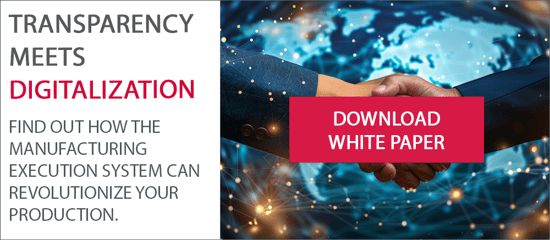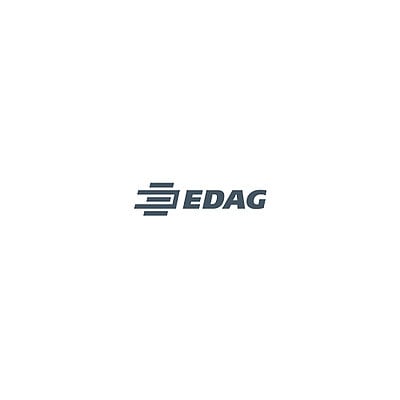In an increasingly digitalized world, medium-sized companies are faced with an urgent question: how can they make their production processes more transparent in order to ensure their competitiveness? A central starting point for achieving this transparency and efficiency and driving digitalization in the company is the Manufacturing Execution System (MES). But which of the numerous MES systems is best suited to the specific requirements? And how can an MES serve as the basis for digital transformation? A structured approach is crucial in order to successfully implement a well thought-out roadmap and fully exploit the potential of an MES in the long term.
Many medium-sized companies, especially in the manufacturing industry, face the challenge that their processes are not sufficiently digitized. Important key figures are often recorded in isolated Excel files or databases and there is a lack of a central database, which is essential for making well-founded decisions and efficiently managing production. The need for digitalization is undisputed - without transparent and networked data structures, it is virtually impossible to manage production processes efficiently and remain competitive.
An MES offers a central solution approach here. It creates a consistent database and enables the monitoring and optimization of production processes in real time. This creates transparency and lays the foundation for well-founded decisions.
The path to the solution: MES as the key to efficiency
 An MES is not only used for data acquisition, but also offers a comprehensive platform for controlling and monitoring the entire production and business processes. It provides real-time data that can be used to identify bottlenecks at an early stage and efficiently optimize production processes. It also enables the use of production data in simulation models. With the help of digital twins, various scenarios can be run through and optimizations can be tested before they are actually implemented, which saves costs and minimizes risks.
An MES is not only used for data acquisition, but also offers a comprehensive platform for controlling and monitoring the entire production and business processes. It provides real-time data that can be used to identify bottlenecks at an early stage and efficiently optimize production processes. It also enables the use of production data in simulation models. With the help of digital twins, various scenarios can be run through and optimizations can be tested before they are actually implemented, which saves costs and minimizes risks.
Another vivid practical example of the benefits of an MES: many medium-sized companies still work with paper-based work preparation. By digitizing these processes with an MES, work preparation becomes more flexible and efficient. Changes can be implemented in real time and the entire paper process is no longer necessary - this not only saves time, but also costs.
Dr.-Ing. Abdul Azem, Head of Production Development, TROX GmbH:
"Together with EDAG, we held workshops to work out the use case of paperless production as the scenario with the highest ROI and the greatest positive impact on our production. Based on this, a big picture was created with initial solution approaches. The requirements for our future MES were defined, a roadmap was developed and the right provider was selected based on specific project criteria. Following a successful test phase on a pilot line, we benefit from significantly increased transparency and valuable experience, which forms a solid basis for the rollout. Our employees enjoy working actively with the new system."
Flexibility and integration in the MES
Modern MES solutions offer far more than just the digitalization of existing processes. They are based on flexible, modular architectures and open interfaces that enable the seamless integration of new technologies. One example is the use of edge computing, in which data is recorded decentrally at the machines and evaluated in real time in order to incorporate optimizations directly into production.
In addition, an MES can act as an integral part of a smart ecosystem by collecting production data and making it available in real time. In combination with a data platform, it enables end-to-end networking and analysis of data from different areas of the company in order to make informed decisions and increase the efficiency of production processes.
An important trend is the convergence of IT and OT (Operational Technology). The previous separation of these two areas is increasingly being eliminated and MES solutions must be able to process data from both worlds efficiently. The standard OPC-UA for networking systems plays a central role here, as MES act as an interface and thus enable the exchange of data between machines and the company's IT. These solutions not only offer efficient management of data streams, but also support the management of digital twins, which companies can use to simulate and optimize production processes in real time, as described above.
The right MES roadmap: EDAG accompanies you on your way
 The introduction of an MES is a complex process that needs to be well thought out and planned. EDAG supports companies with 2 to 3-day workshops to jointly analyze the specific requirements and challenges.
The introduction of an MES is a complex process that needs to be well thought out and planned. EDAG supports companies with 2 to 3-day workshops to jointly analyze the specific requirements and challenges.
The workshops are structured:
- First, the status quo is recorded: What production processes are currently running, what IT infrastructure is in place?
- The pain points are then identified - both in production and in IT.
- Based on these findings, EDAG develops a "big picture" that shows the most important fields of action. From this, it is possible to specifically derive which functions the MES must fulfill and which investments are necessary.
- The next step is to define prioritized measures: Where can quick wins be achieved, and where is the return on investment (ROI) greatest?
- At the end of this process, there is not only a clear roadmap for the digital transformation, but also the selection of the right MES system to meet the company's specific requirements.
The diagram shows the process of an MES workshop, which is divided into three central phases: Preparation, implementation and follow-up. 
In the preparation phase, which begins around three weeks before the workshop, a questionnaire is completed on the so-called "pain points". This is used to systematically record the most important challenges and problem areas and serves as the basis for further workshop planning.
The implementation phase itself consists of four modules.
- Module 1 includes the introduction of the participants and ice-breaker activities to get to know the team.
- Module 2 provides initial impetus and outlines the topics.
- In the core workshop (module 3), a detailed evaluation of the collected "pain points" is carried out. Various methods such as Kaizen (Genchi Genbutsu), TOC (Theory of Constraints), value stream mapping and value stream design - each with an IT focus - are used. Design thinking is also used to promote creative approaches to solutions. In the sub-modules, the status quo is analyzed, specific objectives are defined and the achievement of objectives is planned.
- Module 4, in which the results are summarized, concludes the implementation phase. This includes a photo protocol, a catalog of measures, a roadmap and a cost-benefit analysis using an ROI calculator.
The final follow-up phase takes place one to two weeks after the workshop and includes the final documentation and consolidation of the results.
EDAG provides holistic and neutral support - from the initial analysis to the selection and implementation of the appropriate MES system and accompanies companies throughout the entire introduction and adaptation process.
Markus Sauer, Project Manager BORA Factory, BORA Vertriebs GmbH & Co KG:
"EDAG provided us with significant and constructive support in planning our digitalization strategy for the new assembly of kitchen appliances. After recording our requirements, the central fields of action were identified, a big picture was created and interfaces to existing systems were analyzed and precisely integrated into our IT strategy. The return-on-investment analysis carried out helped us to plan the necessary budget for the relevant measures in a timely manner and to successfully initiate the first steps towards implementing the new assembly plant."
EDAG as a strategic partner for medium-sized companies

The introduction of an MES is a mammoth project for many medium-sized companies. However, with the right planning and an experienced partner like EDAG, the path to digital transformation becomes clearer and easier. EDAG supports companies not only in selecting the right MES, but also in implementing it, adapting it to individual requirements and offering holistic support during implementation as well as ongoing support. With customized workshops and roadmaps, EDAG ensures that the digital transformation is implemented efficiently, that companies save costs in the long term and that their competitiveness is sustainably strengthened.
Martin Eibeck, Project Manager MES &SCADA, VACUUMSCHMELZE GmbH & Co:
"EDAG's workshops guided us through the entire process in a structured manner. First, the status quo of our production processes and IT infrastructure was recorded. EDAG then helped us to identify pain points in both production and IT. On this basis, a 'big picture' was developed, which identified key areas for action and derived clear requirements for the future MES. In the end, we not only had a clear roadmap, but also the right MES system that was optimally tailored to our needs. EDAG guided us efficiently through the entire process - from the analysis to the current implementation."
Would you like to find out more about our workshops? Then contact our expert Emma Nau, Project Manager Production IT, EDAG Production Solutions. Or download our free white paper “Efficient production in the smart ecosystem: how an MES transforms your processes”. Let's shape your digital future together! 





